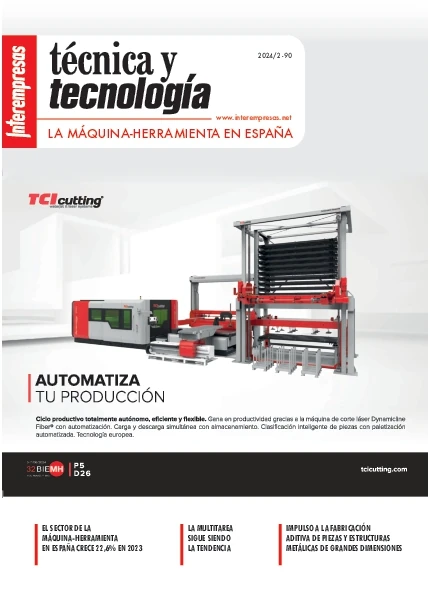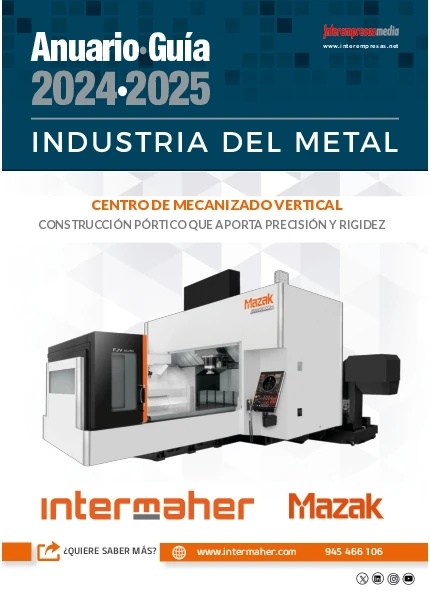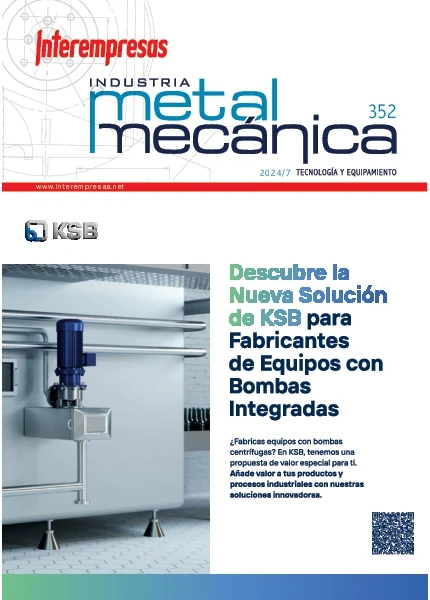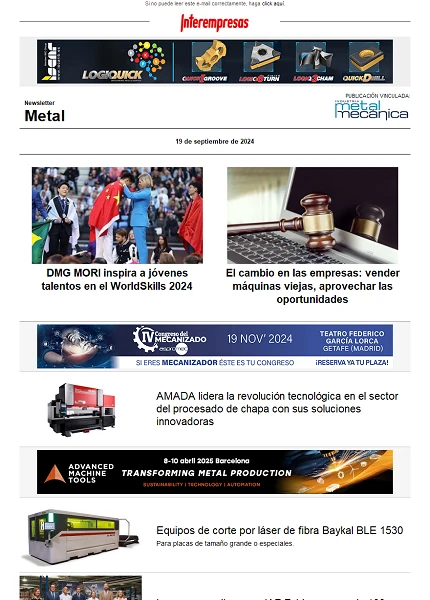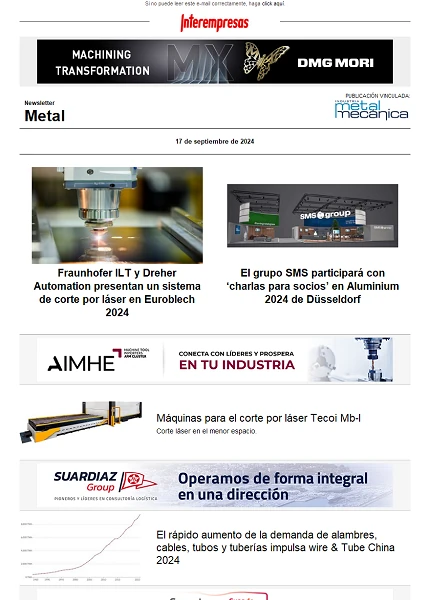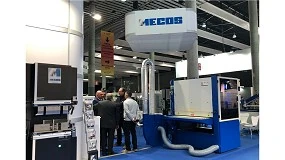Entrevista a Javier Eguren, presidente de Cecimo
Usted es presidente de Cecimo. ¿Cómo se organiza este mandato?
El mandato de Cecimo de presidencia es bienal. El mío comenzó en octubre de 2007 y por tanto finaliza en octubre de 2009 tras la celebración de la EMO.
¿Es precisamente su presidencia la que ha atraído a San Sebastián la Asamblea de Primavera, o también el lugar de celebración está ya planificado y asignado a diversas localidades independientemente de la presidencia?
Realmente es una mezcla de motivos, porque era el turno de Portugal pero comunicó a Cecimo sus dificultades para organizar un evento de estas magnitudes, de tal forma que se decidió hacerlo en España, donde San Sebastián fue elegido como el lugar más apropiado.

¿Cómo son estas asambleas como la celebrada en junio? ¿Cuántas tienen lugar al año?
Se celebran dos al año. He de decir que cuando llegué a la presidencia lo primero que quisimos hacer fue dar un vuelco a estas asambleas, para convertirlas en actos con más interés para los participantes y no tanto en reuniones internas con asuntos muy relacionados con la propia organización que, en nuestra opinión, no era lo que necesita una entidad como Cecimo. En definitiva, hicimos una selección de temas estratégicos y, lógicamente, el tema de la crisis fue el elegido para ser tratado en esta última asamblea.
¿Y dentro de la crisis cuáles fueron los objetivos principales? ¿Qué se pretende cuando se reúnen los representantes de los principales países fabricantes del mundo?
Nuestros objetivos para esta última asamblea se pueden dividir en tres bloques: el primero, cómo hacer uso de las iniciativas de la UE para paliar los efectos de la crisis, el segundo, localizar los indicadores que nos permitan adelantarnos a visualizar cómo se va a comportar la entrada de pedidos en el futuro y, el tercero, estudiar la imagen y la comunicación del sector con el mundo financiero.
Con respecto a las iniciativas de la UE, el análisis se centró en las ayudas financieras y de apoyo al I+D y la innovación.
Por lo que se refiere a los indicadores, Cecimo está estableciendo una serie de índices que nos permitan anticiparnos a lo que va ocurrir, es decir, queríamos localizar las variables que posibiliten la predicción real de cómo se va a comportar el mercado en los próximos meses y cómo va a afectar esto a la entrada de pedidos.
El primer indicador que hemos decidido tener en cuenta es el bursátil. Hemos buscado la correlación entre el valor de las empresas de máquina-herramienta que cotizan en bolsa en Europa -unas 20- y en el mundo -unas 30-. Y ciertamente, observamos que hay una relación muy clara entre esos índices bursátiles y la entrada de pedidos.
El segundo indicador lo hemos basado en los análisis del experto Peter Meier, ex-directivo de una de las principales empresas de máquina-herramienta y actualmente consultor independiente. Peter Meier trabaja basándose en un índice de confianza empresarial y logra realizar pronósticos a 12 ó 18 meses que tienen un altísimo grado de coincidencia con la realidad de la captación de pedidos.
Y en tercer lugar, nos apoyamos en Oxford Economics, una consultora prospectiva cuyos análisis consideramos muy ajustados a la realidad. Con todo ello nos vemos más capaces de estimar cómo va a transcurrir el futuro más inmediato para el sector.
¿Qué podemos hacer para salir de esta situación?
Yo diría que la flexibilidad para ajustar las capacidades a la actual situación del mercado, es fundamental hoy en día. Por otro lado, tenemos que ser capaces de atacar selectivamente los mercados geográficos que están saliendo antes de la crisis, como China. Los indicadores de que China está empezando a cambiar de ciclo ya son claros. Además, la demanda también se ha iniciado a recuperar en los otros países BRIC, expresión que se refiere a Brasil, Rusia, India y China. No tenemos duda de que van a ser, están siendo ya, los que antes van a demandar bienes de equipo.
Los fabricantes españoles de máquina-herramienta tienen desde hace tiempo una visión de mercado global, la balanza comercial es positiva, pero suponemos que no todos están preparados para esto...
Efectivamente, estar presente en los mercados globales requiere una dimensión determinada, un tema del que hablamos de forma recurrente. Una empresa pequeña también tiene ventajas y sus propias armas, pero si los pequeños no son capaces de estar presentes en los mercados emergentes van a sufrir mucho y algunos no superarán esta crisis. De todas formas, vender a Europa ya prácticamente no lo consideramos exportación, Europa es ya nuestro mercado doméstico y los fabricantes españoles vendemos en estos países de forma natural y continuada. Nuestras empresas ya están internacionalizadas, es decir, ese paso ya lo tenemos ganado. Esto es muy atípico si nos comparamos con otros sectores, pero es precisamente uno de los factores que nos van a permitir salir adelante.
Para los fabricantes españoles el periodo aproximado desde septiembre de 2008 hasta el momento ha sido muy malo desde el punto de vista de los pedidos. Teniendo en cuenta que exportamos aproximadamente el 70% de nuestra producción, la búsqueda de otros mercados geográficos tampoco parece que esté siendo una salida a la crisis.
A pesar de que nuestros fabricantes de máquinas ya tienen totalmente integrada en su filosofía la internacionalización, no cabe duda de que la venta en otros mercados geográficos es nuestra salida. Cuando desde la Administración se describen los pasos importantes a dar por las empresas para salir de la crisis, lo cierto es que están describiendo un proceso que los fabricantes de máquina-herramienta han venido realizando desde hace tiempo. Se ha apostado por todo lo que se dice: I+D, formación, búsqueda de mercados externos... Sí, buscar otros mercados es una salida. Lo que está ocurriendo es que, por primera vez, la crisis es tan global, que no se salva de ella ninguno de los principales bloques económicos del mundo. Por eso el efecto positivo de la internacionalización está siendo tan escaso, porque la demanda está bajísima en todos lados. Pero el cambio de clima en China, especialmente, está ya haciendo posibles algunas inversiones.
Además de la internacionalización, los fabricantes de máquina-herramienta invierten en I+D mucho más que otros sectores. Han hecho los deberes, probablemente porque han sabido aprender de otras situaciones negativas. ¿Pero pueden hacer algo más o sólo cabe esperar a que esto pase?
Vamos a demostrar, precisamente gracias a que hemos hecho los deberes, que podemos afrontar la crisis mejor que otros. El comportamiento de la economía es cíclico, probablemente ya se intuía una recesión, pero el ciclo en el que nos encontramos ahora mismo es brutal. Haber hecho los deberes permite ahora que las sociedades estén bien gestionadas, con un elevado grado de flexibilidad, innovación e internacionalización y preparadas para afrontar esta situación. Llevamos la respuesta a los ciclos económicos en el ADN de nuestras organizaciones.
El sector en España dedica el 6% de su facturación a I+D. Es un gran esfuerzo. Sabemos que se debe mantener pero, ¿se puede?
Mantener esa elevada inversión en I+D es un reto al que debemos hacer frente. La única salida para responder a la competencia de los fabricantes de países emergentes es la productividad de nuestras máquinas. Si nuestras soluciones de mecanización, o de producción en general, son más productivas, lo conseguiremos. Y esto sólo lo podemos lograr mediante innovación y aumentando la productividad.
¿Está ese 6% en niveles similares a los de otros países punteros en Europa?
Por los datos que dispongo esa cifra es igual o ligeramente superior a la de países como Alemania o Italia. Obviamente es una cifra promedio que varía de compañía en compañía y de año en año.
El mercado nacional ¿tiene todavía peor aspecto que el de las exportaciones?
Está totalmente parado, pero pienso que la vocación industrial de algunas áreas es importante. Por situarnos, Europa es líder mundial en la producción de máquinas-herramienta, con el 44% de la producción mundial, y dentro de Europa no cabe duda de que Alemania, Italia o Suiza tienen un protagonismo especial. Yo diría que eso mismo ocurre con el País Vasco, donde tradicionalmente se ha apostado por la industria, que es uno de los soportes de nuestra economía de un modo muy significativo, a diferencia de otras comunidades. No prevemos ninguna mejora en la demanda nacional de máquina-herramienta antes de fin de 2009, la descartamos totalmente y, es más, creo que seguiremos bajando hasta entonces.
¿Está de acuerdo con algunas afirmaciones que señalan que lo peor ya ha pasado?
No, en nuestro sector desde luego eso no es así.
¿Cómo cree que cerrarán el año los fabricantes de máquina-herramienta españoles y qué piensa que ocurrirá en 2010?
Creo que las carteras de pedidos estarán mejor en 2010, pero no así las cuentas de resultados. Esto hará que el ambiente sea mejor, aunque la situación real empresarial será peor que en 2009. Creemos que tocaremos fondo a final de 2009, con lo que empezará a mejorar la cartera de pedidos, pero esto no se notará en las cuentas de las sociedades hasta meses después, precisamente por ese periodo de unos seis a ocho meses que hay desde que se capta un pedido hasta que se entrega.
Con esta grave crisis ya nadie habla de otros problemas que nos preocupaban cuando las cosas iban mejor. ¿Qué futuro le augura a la 'producción' en Europa? ¿Será lo especial y el alto valor nuestra única posibilidad de sobrevivir?
Seguro. Frente a fabricantes de las dimensiones que tienen los japoneses, chinos o coreanos, con empresas muy integradas, a nosotros nos queda ser líderes en innovación y diferenciarnos tecnológicamente. La orientación de muchos de los constructores chinos es el volumen, quieren crecer a toda costa, incluso descuidando el margen y la calidad. En Europa tenemos un buen número de grandes empresas que son líderes mundiales en dimensión en sus respectivos segmentos, pero el sector en su conjunto está compuesto fundamentalmente por un tejido de pymes y éstas tienen que competir en nichos. Nos tenemos que identificar y adaptar a esos nichos y ser líderes en ellos.

Hablando de márgenes, ¿cómo está este asunto entre nuestros fabricantes?
Uno de los retos actuales es mantener el margen de las operaciones. En estos momentos de caída de la demanda podemos caer en la trampa de ampliar la cuota de ventas sacrificando el margen, pero esto tiene un enorme riesgo. Yo, desde luego, no lo recomiendo.
Ante las dificultades nos empeñamos en buscar culpables. ¿Qué parte de culpa de lo que está pasando le atribuye ahora mismo a la falta de financiación?
Como todos sabemos, uno de los orígenes de esta crisis está en la crisis financiera. Ya nos aproximábamos a un ciclo de contracción de la economía, pero la especulación financiera, la burbuja inmobiliaria y su carácter global han hecho que la crisis actual sea más profunda que las anteriores. Además, la liquidez en los mercados internacionales ahora mismo es todavía muy limitada y esto está dificultando mucho las operaciones. Es decir, nuestros clientes tienen problemas de financiación para comprar máquinas y los propios fabricantes tienen dificultades para financiar sus empresas.
¿Pediría algo a las administraciones?
La Administración tiene que asegurar los mecanismos que garanticen la financiación para que las empresas competitivas sobrevivan. Sería una pérdida económica y social irrecuperable perder el tejido industrial competitivo por falta de financiación. Se han dado pasos acertados, pero hacen falta más. Un ejemplo de medida muy acertada es suprimir el aval necesario para acceder a ayudas para I+D del CDTI (Centro para el Desarrollo Tecnológico Industrial. Entidad Pública Empresarial, dependiente del Ministerio de Ciencia e Innovación), porque no cambia los presupuestos ni requiere más recursos, pero facilita el acceso a esa inyección de tesorería.
Desde su condición de presidente de Cecimo, ¿observa actuaciones de Administraciones de otros países que no se estén llevando aquí y que podrían ser muy positivas?
Hay acciones interesantes como el plan 'Renove' para máquinas que han puesto en marcha en Italia o el programa de la reducción del tipo de interés en los préstamos para aquellas sociedades que eran rentables el 1 de julio de 2008, es decir, antes del gran golpeo de la crisis.


